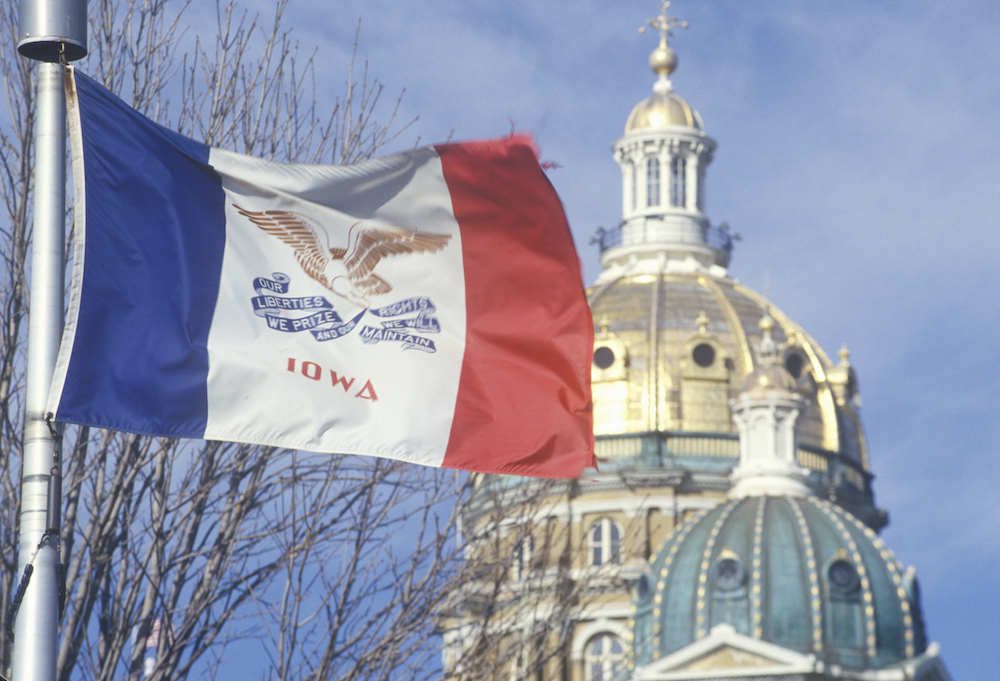Linda Schreiber is a member of the League of Women Voters of Johnson County.
Amending the Iowa Constitution is a long process. State lawmakers must approve identical language in two consecutive separately elected legislatures before a proposed amendment goes on a statewide ballot.
This November, in addition to electing candidates for federal, state, and county offices, Iowans will consider two proposed state constitutional amendments: on Voting Age and Citizenship, and on Gubernatorial Succession.
Citizenship, Voting Age Amendment
Section 1 of Article II of Iowa’s Constitution as amended in 1970, Voting Age and Citizenship, is addressed in three sentences. However, this amendment changes the wording of this section in one very important way.
“Section 1. Electors. Only a citizen of the United States of the age of eighteen years, who shall have been a resident of this state for such period of time as shall be provided by law and of the county in which the citizen claims the citizen’s vote for such period of time as shall be provided by law, shall be entitled to vote at all elections which are authorized by law. However, for purposes of a primary election, a United States citizen must be at least eighteen years of age as of the next general election following the primary election. The required periods of residence shall not exceed six months in this state and sixty days in the county.”
No one questions the proposal to allow 17-year-olds who will be 18 by the General Election to vote in primary elections. 18-year-olds are already voting.
Changing the first word of the proposal, “Only” is extremely concerning. The current section of Iowa’s Constitution states “Every.” Why change a word that may lead to potential misunderstandings in the future? Is the intent to allow only U.S. citizens to vote or does the GOP-dominated legislature want to restrict or prevent Iowans who hold dual citizenship from voting?
In 1967, the U.S. Supreme Court struck down most laws forbidding dual citizenship. In 2024, Iowa is one of eight states voting on a constitutional ballot amendment to prohibit the state or local governments from allowing non-citizen voting. Other states are Idaho, Kentucky, Missouri, North Carolina, Oklahoma, South Carolina, and Wisconsin.
Since the first census in 1790, citizens and non-citizens have been included in the official population count of the U.S. however the census does not identify those who hold dual citizenship. The House passed HR 7109 to include a question of U.S. citizenship on the federal census, but that bill failed a Senate filibuster and did not advance.
Is it a concern that too many non-citizens are voting? It is illegal for non-citizens to vote in federal or state elections in the United States. There is no evidence that unauthorized immigrants, green-card holders, or immigrants on temporary visas are voting in significant numbers, despite some claims that “millions” of non-citizens are voting in U.S. elections. Election official audits and numerous studies reflect that voter fraud by non-citizens is extremely rare.
By 1924, all states banned non-citizens from voting in federal elections. Congress added criminal penalties in 1996: non-citizens face up to five years in federal prison for even registering to vote and illegal voting can trigger immigration consequences, including deportation.
Gubernatorial Succession Amendment
The second proposal addresses gubernatorial succession: Section 17 of Article IV of the Constitution of the State of Iowa. If the governor dies, resigns, or is removed from office, this measure awards the office of governor to the lieutenant governor for the remainder of the term, thereby creating a vacancy in the office of lieutenant governor. If the lieutenant governor is impeached, displaced, resigns, or dies or is incapable of performing the duties, the president pro tempore of the senate will serve as governor until the vacancy is filled by an election.
The amendment seeks to ensure a line of succession. However, if the governor and lieutenant governor both vacate their positions for any reason, the role of the governor would be passed to the president pro tempore of the senate, a person who was not elected to the position but instead selected for the office by the dominant party in the senate and possibly not the party of the governor. If this occurs, it would mean the governor would not be elected by voters, a concern expressed by some legislators.
Iowans wonder what’s taking the governor so long to appoint a lieutenant governor.
Voters must do their civic duty—study the issues to determine how and who will earn their vote in November.


2 Comments
Iowa nice
“In 2024, Iowa is one of eight states voting on a constitutional ballot amendment to prohibit the state or local governments from allowing non-citizen voting. Other states are Idaho, Kentucky, Missouri, North Carolina, Oklahoma, South Carolina, and Wisconsin.”
Permanent residents (green card holders) pay taxes, have lived in America for many years. Typically, their children are US citizens, and go to Iowa schools. These people should have the right to vote on school boards or other local matters.
Karl M Fri 25 Oct 6:48 AM
I wish this well-worth-reading post had appeared earlier in October.
For better or worse, early voting is what thousands of Iowans are doing now. I hope that in future election years, BH posts like this will appear before early voting begins. (And I hope that future elections will be normal elections. I don’t take that for granted anymore.)
PrairieFan Fri 25 Oct 4:31 PM